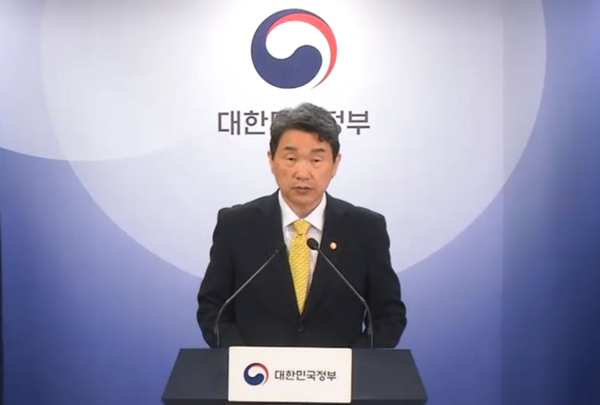After the Seoul National University College of Medicine approved a leave of absence for medical students, the government immediately responded.
The government said it would allow the students to take a “conditional leave of absence” on the premise that they return to school in the first semester of the 2025 academic year. Policymakers are also considering flexibly operating the medical school curriculum by shortening it from six to five years, it added.

Minister of Education Lee Ju-ho said so on Sunday while announcing the “emergency plan for normalizing medical school academic affairs.” Lee stressed that the government will approve leaves of absence only if the schools specify their students’ return next year.
In this process, the government will confirm that students wanting to take a leave of absence have no intention of joining in massive class boycotts by making them correct previously submitted applications for leave of absence.
Accordingly, universities can approve a leave of absence only after reviewing each student's individual reasons for taking time off and supporting documents and specifying a return date before the start of the 2025 academic year.
Officials said if students cannot provide valid reasons for their leave of absence in line with academic regulations, they will not be eligible. If students repeatedly fail to return, universities should strictly enforce academic regulations, which may include expulsion or failing.
In addition, regulations will be implemented to limit continuous leave of absence for more than two semesters unless there are special reasons. They added that the idea is to increase the predictability and stability of the medical workforce.
In addition, the government will consider shortening the curriculum from the current six years to five, considering the gap in the training of medical personnel due to the prolonged disruption of the academic year. To this end, the Education Ministry will discuss the schedule of the national medical examination and the flexibility of the selection period for trainee doctors with the Health and Welfare Ministry.
“It has been eight months since medical students have not returned. I think it's the last chance for students to return,” Minister Lee said. “The plan includes measures that encourage universities to make the last effort to return at this time as much as possible.”
Even if students take a leave of absence for personal reasons, the policy is to make it conditional on their return. This requirement is to ensure all students return before the first semester of the next academic year begins. To this end, the government will respond strictly with a strong will, Lee emphasized.
Doctors strongly protest the proposal, calling it 'shoddy and unconstitutional’
The medical community reacted fiercely to the Ministry of Education's proposal to conditionally approve medical students' leave of absence and shorten the medical school curriculum by one year.
The Korean Medical Association and the Korean Academy of Medical Sciences issued a joint position statement immediately after the Ministry of Education announced the emergency plan, criticizing it as a “hasty measure to hide the poor education” and “openly trying to fix the poor medical education.”
They called the ministry's measures “anti-constitutional” as they “infringe on the autonomy of universities” and “take away the basic rights of medical students as citizens.”
“What right does the Ministry of Education have to intervene in the approval of a leave of absence when a student who pays his tuition and studies without government assistance has voluntarily and autonomously discontinued his studies,” it said, stressing that it is entirely up to the student to decide whether to continue his education or take a leave of absence.
“It is time to move away from the obsession with increasing medical school enrollment quota at all costs,” the statement said. “The only way to bring back medical students is to apologize for the unilateral policy and declare that it will be done in consultation with the medical community.”
“What could happen only in a totalitarian dictatorship has happened in the free democratic Republic of Korea in 2024,” it said. “We are extremely outraged by the unreasonable measures that are destroying medical education and endangering the public's health, and we strictly condemn the government's overreach.”
Park Dan, head of the Korean Intern Resident Association emergency committee, also criticized the Ministry of Education's measures on his social media account. “The minister of education is leading the way in poor education,” Park said. “Is it fair and common sense for the current government to disallow medical students to take a leave of absence?”
Park also said that medical students will " not return, "saying, “Let alone returning to school, the decisions of next year's medical school freshmen (will) be no different from those of their seniors.”
Related articles
- Doctor shortage looms as only 347 candidates take state medical exam, down 90% from 2023
- ‘Healthcare reform to save essential care will lead to commercializing medical system’
- Will the 22nd Assembly find keys to resolving medical crisis at its 1st parliamentary audit?
- Doctors earn the most among professionals, which explains reason for medical school craze: lawmaker
- Yoon reiterates his will to push ahead with physician increase and healthcare reform
- Education Ministry dodges questions on medical school enrollment quotas
- Patient group urges immediate withdrawal of 5-year medical school plan, citing confusion, patient suffering
- Specialist shortage looms as only 576 trainee doctors eligible for next year’s exam
- 5-year medical school, if realized, would put Korea back to Japanese colonial era

